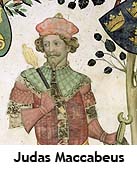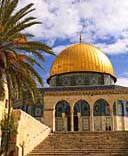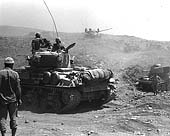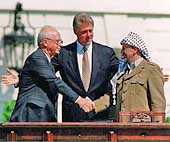Israel
The small (densely populated) State of Israel occupies about 75% of an area long known as Canaan. It has a population of 7,707,042 and became an independent state in 1948, celebrating their national day on May 14th. This historic, volatile spot is significant for Christians, Muslims and Jews, as Jerusalem is recognized as a holy city by all three religious faiths.
 The Old Testament of the Bible (the Jewish Torah), describes how, after being led out of Egyptby Moses into the land of Canaan, Hebrew tribes, the descendants of the 12 sons of Jacob, settled and later formed the Northern Kingdom of Israel.
The Old Testament of the Bible (the Jewish Torah), describes how, after being led out of Egyptby Moses into the land of Canaan, Hebrew tribes, the descendants of the 12 sons of Jacob, settled and later formed the Northern Kingdom of Israel.
Constant warfare was common between the Jews and neighboring tribes, and the kingdom was ultimately split into two: the Kingdom of Judah and the Kingdom of Israel.
Around 750 BC, the Kingdom of Israel was annihilated by the Assyrians, but an attempt at gaining control of Judah failed. The Assyrians commanded the region for only a short time before being conquered by the New Babylonian Empire in 612 BC. According to the Hebrew Bible, King Nebuchadnezzar II of Babylon ravaged Solomon's Temple, forcing the Jews into exile.
In the centuries to follow, Israel was taken over by numerous strong leaders, including Cyrus the Great of Persia in 538 BC and Alexander the Great in 333 BC.
 In the 2nd century BC, an attempt by Antiochus IV of the Seleucid Empire to abolish Judaism for a Hellenistic religion sparked the Maccabean Revolt, led by Judas Maccabeus. The uprising ended the Greek rule, and Maccabeus' victory is celebrated in the festival of Hanukkah.
In the 2nd century BC, an attempt by Antiochus IV of the Seleucid Empire to abolish Judaism for a Hellenistic religion sparked the Maccabean Revolt, led by Judas Maccabeus. The uprising ended the Greek rule, and Maccabeus' victory is celebrated in the festival of Hanukkah.
Insurrections within the region continued for centuries. The First Jewish Revolt in 66 AD, against the Roman Empire, ended with the defeat of the Jews, dispersing much of the population to other areas around the Mediterranean, and forcing the remaining to be sold into slavery.
As decades progressed, the Jewish community became banned from several areas, including Cyprus, Jerusalem and the Roman province.
Jewish leader, Simon Bar Kokhba, sparked another major revolt in 132 AD, known as the Bar-Kochba revolt, which was the last of the Jewish-Roman Wars. Unfortunately, the outcome was not in the Jewish favor, as hundreds of thousands were massacred, and the Jewish religious and political authority became suppressed.
Jerusalem's name was restored early in the 4th century as a Christian city, and although still banned, the Jewish people were granted permission to visit. During this period, the Western Wall of the temple became a sacred place.
 Around the year 634, Arabs came into rule, pushing out the Byzantine Empire, and lifting the ban on Jews living in Jerusalem. The Dome of the Rock shrine was constructed on the Temple Mount in 691, and the Al-Aqsa Mosque followed shortly after.
Around the year 634, Arabs came into rule, pushing out the Byzantine Empire, and lifting the ban on Jews living in Jerusalem. The Dome of the Rock shrine was constructed on the Temple Mount in 691, and the Al-Aqsa Mosque followed shortly after.
Arab rule ended with the onset of the crusades, as both Muslims and Jews were killed or sold into slavery, and the area became a front seat to the Mongol invaders and Mamluks of Egypt.
After the end of the Crusades in 1291, the Mamluks commanded the region until 1517, when Turkish Sultan Selim II gained control, and incorporated the area into a province of Syria for the next 400 years.
The Jews finally began to see relief during the 18th and 19th centuries with the Age of Enlightenment in Europe, and the Haskalah movement. However, much of the Jewish population was still restricted to what was known as the Pale of Settlement, a part of Imperial Russia, despite the change in anti-Jewish prejudice.
At the emergence of the Zionist movement in the early 1900s, thousands of Jews migrated into Palestine, and measures were set into place to establish a permanent, more secure Jewish state.
By decree, on May 14, 1948, an agreement between the Jews and Arabs to partition Palestine, and later recommended by a special committee of the United Nations in 1947, was the force that formed the official State of Israel. ( A map of that suggested land division is here).
The agreement was later rejected by the Arabs, as it conflicted with their long-held historical ties to Palestine.
 On June 5, 1967, Israel instigated a pre-emptive strike against Egypt,Jordan, Syria and Iraq. During this Six-Day War, Israel was successful in conquering the West Bank, the Gaza Strip, Sinai Peninsula and the Golan Heights.
On June 5, 1967, Israel instigated a pre-emptive strike against Egypt,Jordan, Syria and Iraq. During this Six-Day War, Israel was successful in conquering the West Bank, the Gaza Strip, Sinai Peninsula and the Golan Heights.
As the Jews observed Yom Kippur in October of 1973, theEgyptian and Syrian armies launched a surprise attack against Israel; however the country was successful in resisting the forces.
Despite the victory, the public grew angry with Prime Minister Golda Meir, forcing her to resign.The next two decades were riddled with violence, as Israel attacked and was in return attacked by various countries in the Arab world, along with initiatives towards reconciliation and peace
The Camp David Accords (officially the "Framework for Peace in the Middle East" agreements) between Israel's Prime Minister Menachem Begin and Egypt's President Anwar el-Sādāt, brokered by the US President Jimmy Carter, was the first treaty of this type between Israel and any of its Arab neighbors. Signed in 1978, The peace between Israel and Egypt resulting from the treaty has largely continued to exist, and both Begin and Sādāt received the Nobel Prize for Peace for their efforts.
 Yitzhak Rabin was elected Prime Minister in 1992, and called for a compromise with Israel's neighbors. The Oslo Accords were signed the following year between Israel and Palestine, as an attempt to extinguish any outstanding status issues between the two sides, and the Palestinian National Authority was granted the right to govern parts of the West Bank and Gaza Strip.
Yitzhak Rabin was elected Prime Minister in 1992, and called for a compromise with Israel's neighbors. The Oslo Accords were signed the following year between Israel and Palestine, as an attempt to extinguish any outstanding status issues between the two sides, and the Palestinian National Authority was granted the right to govern parts of the West Bank and Gaza Strip.
The Israel-Jordan Treaty of Peace was signed in 1994, also normalizing relations between the two countries.
Support of the Accords by the Jewish population decreased, however, as Israel came under attack by Palestine, and in 1995 following a peace rally, Yitzhak Rabin was assassinated by a far-right-wing Jew.
Negotiations continued into the new millennium betweenPalestine and Israel. Today, the West Bank is partially Israeli-occupied, but Israel, in September, 2005, withdrew all Israeli settlers and soldiers and dismantled its military facilities in the Gaza Strip. Nonetheless, Israel controls maritime, airspace, and most access to the Gaza Strip.
In July of 2006, the country of Israel and Hezbollah forces withinLebanon began fighting a bloody war; one with thousands of civilians caught in the middle. The Second Lebanon War lasted until a cease fire took effect on August 14th, 2006.
 One of the largest social protests in Israel's history took place on July 14, 2011, as hundreds of thousands of protesters rallied against the continuing rise in the cost of living, as well as the deterioration of public services.
One of the largest social protests in Israel's history took place on July 14, 2011, as hundreds of thousands of protesters rallied against the continuing rise in the cost of living, as well as the deterioration of public services.
Due to ongoing social issues, theU.S. Department of State and other world governments urge their citizens to carefully weigh the necessity of their travel to Israel.
Despite the social warfare, tourism remains one of Israel's major sources of income, and around 3.4 million tourists visit the country annually.
Brimming with historical and religious sites, beach resorts, and numerous tourism hotspots including museums, the Western Wall, and the ruins of Masada in the Judean Desert, Israel is a remarkable, fascinating and controversial country, all in one.
 The Old Testament of the Bible (the Jewish Torah), describes how, after being led out of Egyptby Moses into the land of Canaan, Hebrew tribes, the descendants of the 12 sons of Jacob, settled and later formed the Northern Kingdom of Israel.
The Old Testament of the Bible (the Jewish Torah), describes how, after being led out of Egyptby Moses into the land of Canaan, Hebrew tribes, the descendants of the 12 sons of Jacob, settled and later formed the Northern Kingdom of Israel. Constant warfare was common between the Jews and neighboring tribes, and the kingdom was ultimately split into two: the Kingdom of Judah and the Kingdom of Israel.
Around 750 BC, the Kingdom of Israel was annihilated by the Assyrians, but an attempt at gaining control of Judah failed. The Assyrians commanded the region for only a short time before being conquered by the New Babylonian Empire in 612 BC. According to the Hebrew Bible, King Nebuchadnezzar II of Babylon ravaged Solomon's Temple, forcing the Jews into exile.
In the centuries to follow, Israel was taken over by numerous strong leaders, including Cyrus the Great of Persia in 538 BC and Alexander the Great in 333 BC.
 In the 2nd century BC, an attempt by Antiochus IV of the Seleucid Empire to abolish Judaism for a Hellenistic religion sparked the Maccabean Revolt, led by Judas Maccabeus. The uprising ended the Greek rule, and Maccabeus' victory is celebrated in the festival of Hanukkah.
In the 2nd century BC, an attempt by Antiochus IV of the Seleucid Empire to abolish Judaism for a Hellenistic religion sparked the Maccabean Revolt, led by Judas Maccabeus. The uprising ended the Greek rule, and Maccabeus' victory is celebrated in the festival of Hanukkah. Insurrections within the region continued for centuries. The First Jewish Revolt in 66 AD, against the Roman Empire, ended with the defeat of the Jews, dispersing much of the population to other areas around the Mediterranean, and forcing the remaining to be sold into slavery.
Jewish leader, Simon Bar Kokhba, sparked another major revolt in 132 AD, known as the Bar-Kochba revolt, which was the last of the Jewish-Roman Wars. Unfortunately, the outcome was not in the Jewish favor, as hundreds of thousands were massacred, and the Jewish religious and political authority became suppressed.
No comments:
Post a Comment